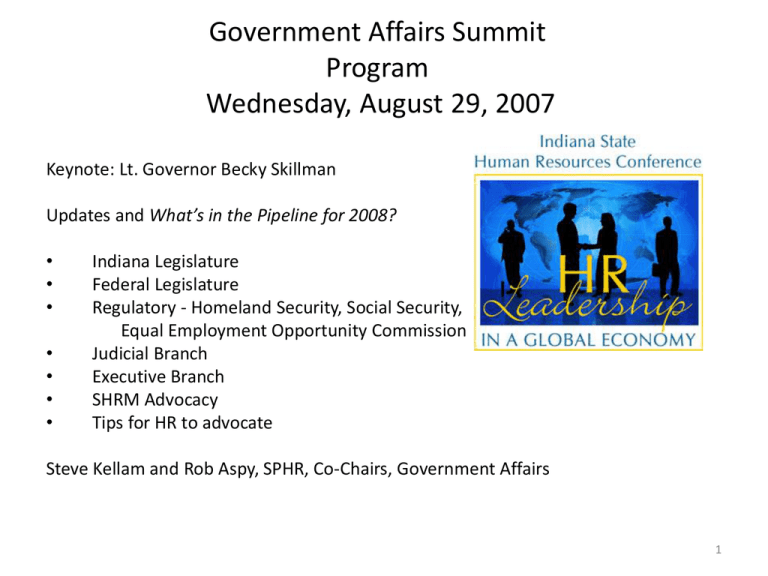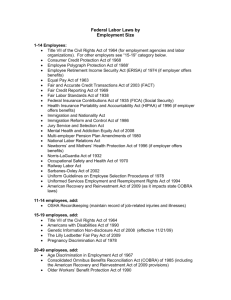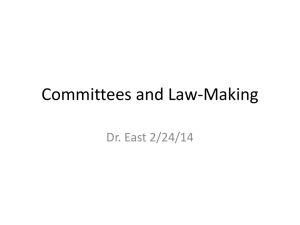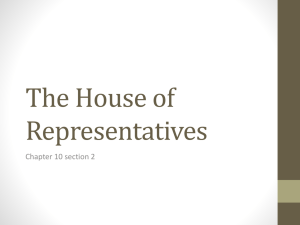SHRMIndianaLegSummit2007FINAL24August2007
advertisement

Government Affairs Summit Program Wednesday, August 29, 2007 Keynote: Lt. Governor Becky Skillman Updates and What’s in the Pipeline for 2008? • • • • • • • Indiana Legislature Federal Legislature Regulatory - Homeland Security, Social Security, Equal Employment Opportunity Commission Judicial Branch Executive Branch SHRM Advocacy Tips for HR to advocate Steve Kellam and Rob Aspy, SPHR, Co-Chairs, Government Affairs 1 State Government August 29, 2007 2 115th General Assembly (2007) 234 new laws 583 bills introduced in the Senate 837 bills introduced in the House HR areas of particular interest (bills introduced): • Unemployment Compensation (7 bills) • Health Care Costs or Insurance. (40 bills: 14 in Senate; 36 in House) Websites of particular HR interest: • www.in.gov/legislative/ • www.in.gov/apps/lsa/session/billwatch/ 3 Senate Enrolled Act 94 (Landske, Kenley, Bowser) [Language change effective on passage] The general assembly finds the following: • [To] persons with a disability [from “disabled”] • [To] "Persons with disabilities" means all persons who by reason of physical or mental disability [from “mental defect”] 4 Senate Enrolled Act 372 (Simpson) • The department [of insurance] shall study the current preauthorization practices and procedures used by insurers and health maintenance organizations. The department may also study standardization (and) whether the practices and procedures… require the establishment of standards to ensure uniformity, timely response, and the provision of reasonably sufficient. • Before November 1, 2007, the department shall report to the legislative council in an electronic format the department's findings. 5 Not Pass after Third Reading HB 1008 Brown C , Brown T , Welch • Requires establishment of a project for a health care management program and a pilot project for small employers to obtain health care coverage for employees 6 House Enrolled 1027 (Day, Micon) • Minimum wage increase Ties the amount of Indiana's minimum hourly wage to the same as federal minimum hourly wage. • $5.85 per hour effective July 24, 2007 • $6.55 per hour effective July 24, 2008 • $7.25 per hour effective July 24, 2009 First increase to the minimum wage in nearly 10 years 7 House Enrolled Act 1092 (Avery) • Military service benefits. Establishes an unpaid leave of absence of up to 10 working days for the spouse, parent, grandparent, or sibling of a person ordered to active duty in the United States armed forces or the National Guard 8 House Enrolled Act 1378 (Van Haaften, Crouch) • A policy of accident and sickness insurance provides coverage for hospital, medical, or surgical expenses; may NOT contain a provision excluding or limiting the insurer's liability under the policy for a loss sustained or contracted in consequence of an insured's intoxication or use of a narcotic. 9 Not Pass HB1397 Ruppel, Bischoff, Koch, Tincher • Prohibits the adoption or enforcement [by an employer] of a policy or rule that prohibits or has the effect of prohibiting an individual who has a valid state issued permit to possess a firearm…that is: (1) locked in the individual's motor vehicle while the motor vehicle is in or on the [employer’s] property; or (2) stored at a location in or on the [employer’s] property that is secure and allows the individual to check the firearm in and out when entering and leaving the person's property. • Excepts possession of a firearm: (1) on school property or a school bus; (2) on certain child care and shelter facility property; (3) on penal facility property; and (4) when permitted under federal law 10 Weapons at work update • Passed five states (Oklahoma was first) • Defeated in eleven states (including Indiana) National SHRM’s statement: • Business is responsible for workplace safety. • Business should make its own decision to allow weapons or not on its property. 11 House Enrolled Act 1678 (C Brown) This bill began use of ‘hospital’ only if facility has an emergency room. Expanded into: • Enrolled Act to provide small employers (two to 100 employees, and not self-funded) a tax credit if provide a qualified wellness program. Plus more… 12 NOT PASS beyond Committee HB 1680 C Brown • Universal health care. Creates a plan of health insurance to provide primary coverage to every resident of Indiana 13 State Legislative Crystal Ball • • • • • Weapons Bill Health Care Workers Compensation Tax Credits for Wellness Programs ? 14 Federal Government August 2007 15 Recent Congressional Activity • HR1257 20 April 2007 – the Shareholder Vote on Executive Compensation Act passed the house 269-134. The bill seeks to increase shareholder input on executive compensation decisions made by boards of directors. 16 Recent Congressional Activity • HR493 25 April 2007 – The Genetic Information Act of 2007 (GINA) passed by a 420-3 vote by the house. Prohibits employers and health insurers from making employment decisions or adjusting benefits solely on the basis of an individual’s genetics. It is likely to pass and be signed. 17 Recent Congressional Activity HR2206 25 May 2007 signed into Law President Bush. It amended the Fair Labor Standards Act (FLSA) to raise the current minimum wage (24 July 2007 $5.85 per hour, 24 July 2008 $6.55 per hour and 24 July 2009 $7.25 per hour). • Contained a $4.84 billion tax relief for small businesses. It is called the Work Opportunity Tax Credit (WOTC) – provides for tax credits for hiring individuals from one or more of nine targeted groups – through August 2012. 18 Recent Congressional Activity • HR800 June 2007 – Senate voted no to consider the Employee Free Choice Act. SHRM members sent 9,200 letters to Senate members. The legislation would enable unions to sidestep workers’ current right to a federally-supervised, private ballot election and, instead, allow unions to collect a majority of signed authorization cards during union organizing drives. 19 Recent Congressional Activity • S1639 June 2007 - Comprehensive Immigration Reform Act – Senate decided not to continue debate. • S1753 9 July 2007 Senators Harkin and Smith introduced the Healthy Workforce Act. The bill provides incentives to employers for offering wellness programs. 20 Recent Congressional Activity • HR1424 18 July 2007 - Paul Wellstone Mental Health and Addiction Equity Act passed out of the House Education and Labor committee. Legislation would required group health plans that include mental health coverage to treat mental illnesses and physical illnesses the same, in terms of deductibles, hospital stays and co-payments. 21 Recent Congressional Activity • HR1585 July 2007 Amendment approved by House to the National Defense Authorization Act for Fiscal Year 2008 to expand the Family and Medical Leave Act (FMLA) to provide leave for military families to deal with exigencies arising from a call to duty. Bill remains under consideration. The Senate as a part of the passing of the Children’s Health insurance Bill HR976 adopted two amendments that would expand FMLA to family caregivers of injured service members. 22 Recent Congressional Activity • 24 July 2007 – Congress is considering changing the definition of employees or independent contractors. SHRM testified before the House Education and Labor committee on this issue. 23 Recent Congressional Activity • HR2831 31 July 2007 - The Ledbetter Fair Pay Act passed the House. (Party line votes from Indiana Reps). If this bill passes the Senate and is signed it would overturn the Supreme Court decision of May 2007, where limits are place on the time workers have to file claims against employers for pay discrimination to six months. The bill places no limits on time. 24 Bills of Interest • HR 1540 – Civil Rights Tax Relief Act of 2007 – Back pay for job-related harassment or discrimination taxable at the rates effective during the years such pay was earned. Remains in committee • HR1542 /S910 – The Healthy Families Act – Requires employers with 15 or more employees to provide seven days of paid sick leave to fulltime (30 hours) workers. Remains in committee 25 Bills of Interest • S1136 – Survivors’ Empowerment and Economic Security Act – Employers with 15 or more employees to provide 30 days of job-protected, unpaid leave to employees to address issues relating to domestic violence. In committee • HR1338/S766 – Paycheck Fairness Act – Amend Fair Labor Standards Act to provide more effective remedies of victims of discrimination in the payment of wages on the basis of sex. In committee 26 Bills of Interest • HR 298 – Flexible spending Accounts Growth and Opportunities Act of 2007 – Will allow up to $1,000 in unused funds in FSA to carry over to the next year. • HR506 – The Health Partnership through Creative Federalism Act – Bill provides grants to states for health coverage for the uninsured. 27 Bills of Interest • S334 – The Healthy American Act – Comprehensive Health Care Reform requires all individuals to purchase health insurance. Subsidies provided to low income families. Employer mandates included • HR 1645 – Security through regularized Immigration and a Vibrant Economy Act – Immigration Reform 28 Bills of Interest • S41 – Research Competitiveness Act – Simplify and make permanent the research and development tax credit. • S239 – Notification of Risk to Personal Data Act of 2007 – Data breach bill • S1038 / HR1748 – Workforce Health Improvement Program – Allows employer to deduct the cost of subsidizing or providing offsite fitness center benefits for their employees. A wellness benefit would not be taxable income for employees. 29 Bills of Interest • HR853 – Wellness and prevention Act – Employers receive up to $200 tax credit per employee that joins the wellness program. • S1141 – Automatic IRA Act of 2007 – Requires employers with more than 10 employees and in business for more than 2 years to provide each employee the option to save for retirement through payroll deposit IRAs in exchange for tax credits up to $250. 30 Bills of Interest • S1178 – Identify Theft prevention Act – Data Breach Bill • S495 – Personal Data Privacy Security Act of 2007 – Privacy of data bill • HR1280 – Tax Equity for Health Plan Beneficiaries Act of 2007 – Extend exclusion from gross income for employer provided health care coverage to certain eligible beneficiaries, including domestic partners and their dependent children. 31 Federal Legislative Crystal Ball • Good Support – Genetic Bill – Good support – FMLA additions for Service Member Families • Probably Not – Ledbetter bill becomes law – Immigration Bill of substance passes – Employee Free Choice Act – Mental Health Act – Health Care Additions 32 Regulatory Agencies Update • Homeland Security announced two actions on unlawful hiring or continued employment of unauthorized workers • Social Security to look at process to issue its numbers to prevent identity theft and fraudulent use 33 EEOC Trends • Race and color discrimination (most charges) • Sex discrimination (2nd most charges) EEOC Priorities and Initiatives: • Systemic discrimination • E-Race (Eradicating Racism And Colorism from Employment) • www.youth.eeoc.gov (Youth @ Work Initiative) 34 New EEOC Enforcement on Disparate Treatment for Caregiving • Caregiver defined as employee who provides care (not the caregiving professionals.) • An action likely to deter a working mother from filing a future EEOC complaint might be less likely to deter someone who does not have substantial caregiving responsibilities. A schedule change in an employee’s work schedule may make little difference to many workers, but may matter enormously to a young mother with school age children. • Caregiving disproportionately affect working women generally…more pronounced among some women of color, particularly African American 35 New Caregiver: EEOC’s training examples http://www.eeoc.gov/policy/docs/qanda_caregiving.html Stereotypes of mothers • Yael returned from maternity leave. She asked to use lunch to breastfeed her child at the child’s day care center. The supervisor began tracking Yael when left and returned from lunch. Admonished when late. Other employees who left the site during lunch were not similarly monitored. Yael reported her supervisor to a higher-level manager who stated “personality conflict.” Yael filed an EEOC charge on sex-based harassment. The investigator determined Yael was subjected to a hostile work environment based on sex and that the employer was liable. • Opposite situation, too: unlawful if for benevolent reasons. 36 New EEOC Enforcement on Disparate Treatment for Caregiving Stereotypes of men as “bread winners” can further lead to gender-based stereotyping, unlawful assumptions about working fathers and other male caregivers. Sometimes, employers deny male employees opportunities that have been provided to working women or subject men who are primary caregivers to harassment or other disparate treatment. 37 New Caregiver: EEOC’s training examples http://www.eeoc.gov/policy/docs/qanda_caregiving.html Hostile work environment charged (time off) Eric, an elementary school teacher, requested unpaid leave for the upcoming school year to care for his newborn son. Although the school allows up to one year of unpaid leave for various personal reasons, including to care for a newborn, the Personnel Director denied the request. Eric pointed out that women were granted childcare leave. The Director said, “That’s different. We have to give childcare leave to women.” He suggested that Eric request unpaid emergency leave, limited to 90 days. Violation of Title VII. The employer denied a male employee a type of leave, unrelated to pregnancy, granted to females. 38 New Caregiver: EEOC’s training examples http://www.eeoc.gov/policy/docs/qanda_caregiving.html Hostile work environment charged (disparate treatment) After Adam (supervisor) learned that the wife of Martin (his employee) had severe multiple sclerosis, Martin was removed from team projects. Adam said coworkers did not think Martin could complete his work “considering his wife’s medical problems.” Adam began requiring Martin to follow company policies that other employees were not required to follow: requesting leave at least a week in advance except for emergencies. Martin complained several times to upper management; the employer did nothing. Martin filed an EEOC charge. The investigator determined that the employer was liable for harassment on the basis of Martin’s association with an individual with a disability. 39 Judicial Branch US Supreme Court (future session) • Case to decide if co-worker testimony is to be excluded from a jury trial to prevent prejudice against the employer (Past Decisions:) • US Supreme Court ruled on June 11th that domestic service exemption applies to agency home health employees • 5th Circuit (Police case that determined paid administrative leave might sometimes be an adverse retaliatory action.) 40 Judicial Branch • Employee fired after complaining about employer-sponsored spiritual practices prevailed on his religious discrimination claim in a case before the 8th U.S. Circuit Court of Appeals. • A Federal district court ruling overturns controversial immigration ordinances enacted by the city government of Hazleton, PA. This sets a precedent for striking down local laws on this issue that have been recently passed. 41 Judicial Branch • US Supreme Court Decision - May 2007 Ledbetter v. Goodyear Tire & Rubber Co. – Landmark case in employment law. The case revolved around the statutory time limit for filing an employment discrimination claim under Title VII of the Civil Rights Act, which requires employees to bring such claims within 180 days of the alleged unlawful employment action. 42 Executive Branch • 27 June 2007, DOL issued a report on the request for information on FMLA. The report has 11 Chapters with information submitted on areas such as the definition of a serious health condition, unscheduled intermittent leave, employee rights and responsibilities, the medical certification and verification process, and the substitution of paid leave. Nothing at this time has been done to resolve the conflicting interpretations in these and many other areas. 43 Executive Branch • 2 July DOL’s Office of Labor-Management Standards issued a final rule on revisions to the Form LM-30 for officer and employees of labor organizations who receive payment from employers and businesses. The new rule may impact Form LM-10 used for employers. 44 Executive Branch • August 2007 – Presidential candidates continue to debate health care and immigration reform. These are two of the top issues being discussed in pre-election positions. 45 SHRM Activism • SHRM provides information and recommendations to members • Our system of government depends on individual input from ordinary citizens to work at its best • Call, email, or send letters to your Federal or State Senators / Representatives • Call, email, or send letters to the Federal or State Executive Department 46 Resources • Information and links are available on the Indiana SHRM State Council website: www.indianashrm.org 47 How to network with legislators? How to network with reporters? www.shrm.org/chapters/resources/Workingw theMedia_Webcast.ppt#286,1,Slide 1 48 Magic Element…Relationship Building • What is Media Relations? (Proactive) • Cardinal Rules (such as be knowledgeable of current events and industry trends) • What is newsworthy? Remember, news that is local, timely, unusual/interesting, about people or surprising. • Know your story (Three key messages) 49 Magic Element…Relationship Building • How to write a press release • Pitch letters • Talking to the media - Prepare - Keep language clear and simple - Use relevant examples -Brand your message 50 Magic Element…Relationship Building • Message Delivery Tips - Use “flag” statements to call attention to your message a. The most important thing… b. The single thing… c. The bottom line is… d. The key thing is… 51 Magic Element…Relationship Building • Message Delivery Tips (Continued) “Bridge” to your message a. Let me put it into perspective… b. What that means is…. c. Let me give you some background information… d. What’s important to remember… 52 Magic Element…Relationship Building • Interview Tips (what clothes to avoid) • Body language Tips (use open gestures, etc.) • Practice, breathe and relax Remember that you are speaking on behalf of your organization. 53 Thanks! Questions? 54




